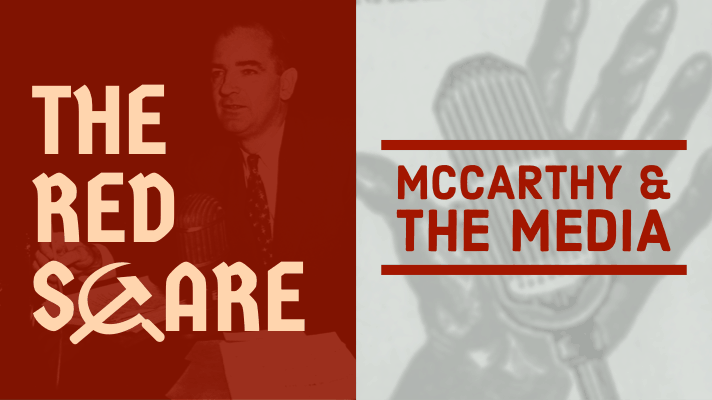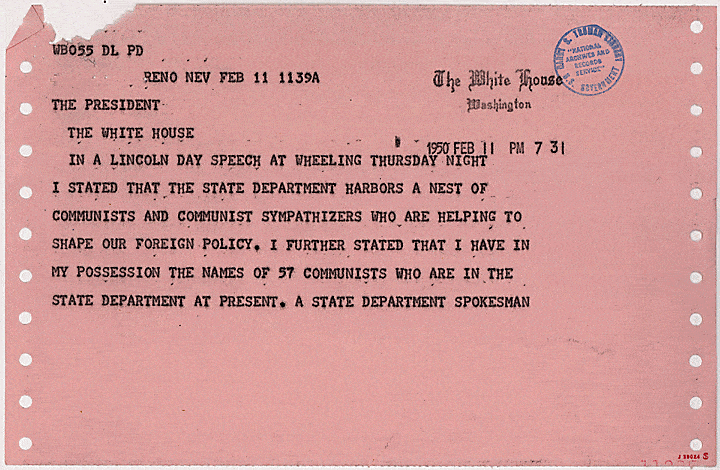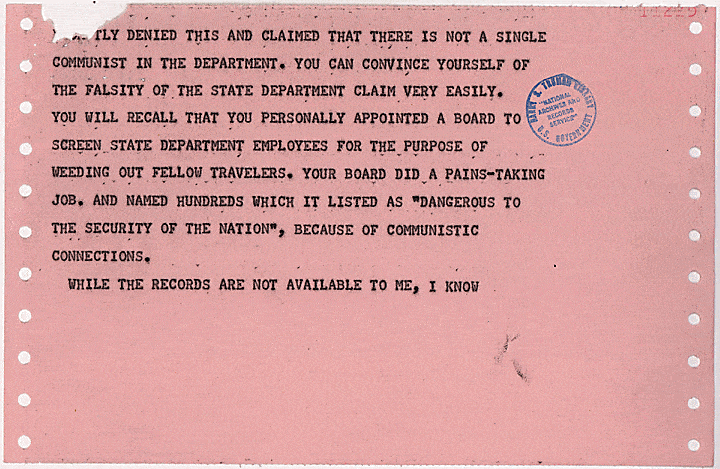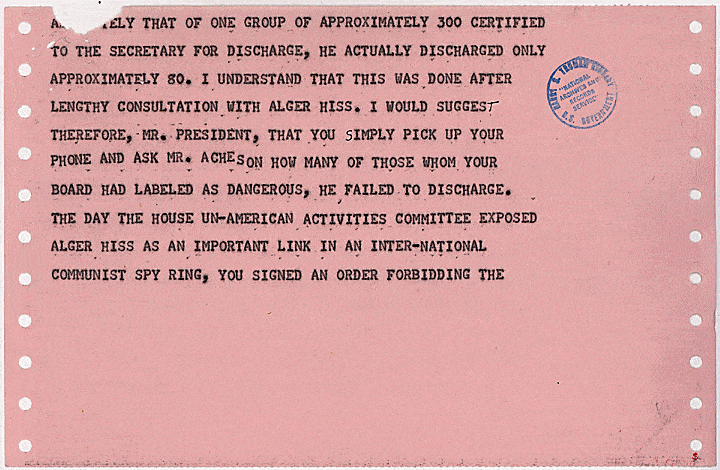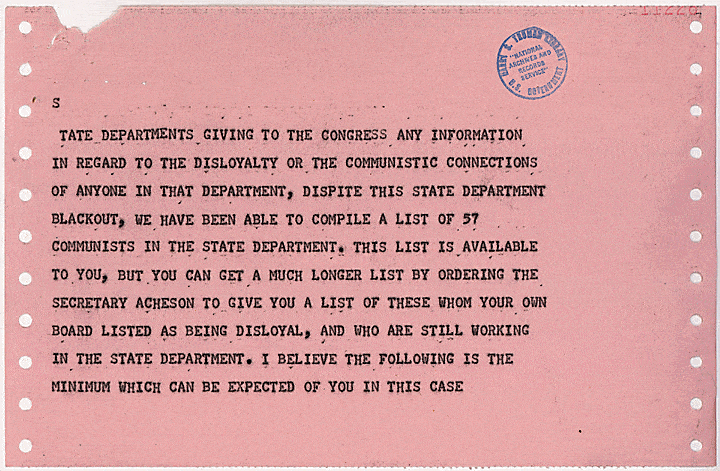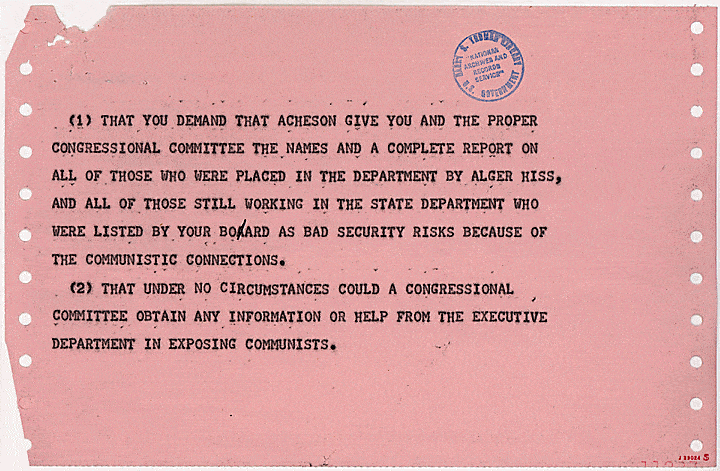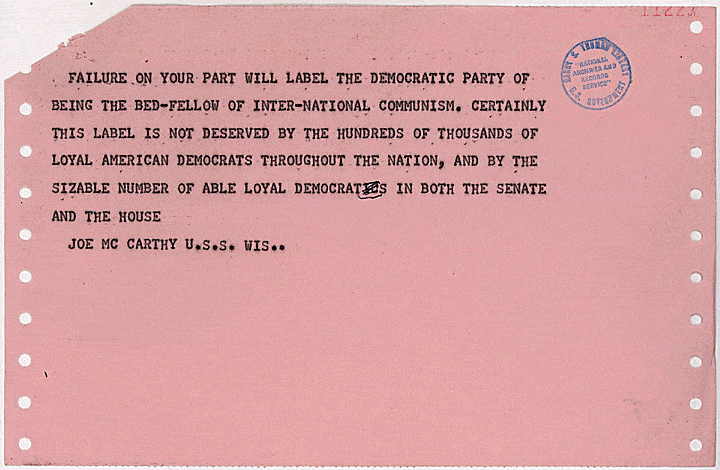Introduction
The end of WWII, two world powers emerged: the United States of America and the Russian Soviet Union. Politics for the remainder of the 20th century would be dominated by the opposing ideologies of the Communist East, and Democratic West.
Despite the powerful position held by the United States in this era, the post-war period was full of anxiety and fear that communism would spread across the globe. In addition to the external threat of communism, Americans began to fear the possibility that communist spies had already infiltrated the very fabric of American democracy. Beginning in the late 1940’s committees were formed to seek out and identify any potential spies working on behalf of communist Russia. These committees investigated radio stations, newspapers, movie studios and performers, schools, universities, even the government itself.
While the term “McCarthyism” today is nearly synonymous with the anti-communist frenzy of the post WWII era, Senator Joseph McCarthy of Wisconsin was not a major figure in the anti-communist movement until 1950 when the “Red Scare” was already at its peak. Yet no other figure would achieve such widespread recognition and infamy as a result of their role in the anti-communist movements of the 1940’s and 50’s.
Check out this TedEd video for more information on McCarthyism and the Red Scare:
- Some say McCarthy’s infamy was largely due to the press who, through bad reporting, brought the senator’s persona to a national audience and further contributed to the hysteria of the Red Scare.
- Others say it was the press who ultimately brought about his downfall in 1954, by exposing him as an liar who abused his power for personal gains.
Making Connections
Today, as we continue to evaluate the role of the press in politics and as a reliable source of information, it is important for us to question how media can shape our perception of the world around us. Where do we get our news? What sources of information do we rely on, and are they reliable? Is the duty of the press to report “straight facts” or should the media provide interpretation and analysis as well?
Essential Question
How did the American media contribute to the rise and fall of Senator Joseph McCarthy? Did McCarthy manipulate the press to serve his own anti-communist agenda? Or was the press ultimately responsible for bringing about McCarthy’s downfall?

Roy Cohn, McCarthy’s aide, acknowledged that the senator’s primary goal was to influence public opinion through the press.
“The basic problem, as seen by a small but informed group in and out of government, was the need to reach the public. Nobody, so far, had been able to make America listen.”
Excerpt: Joe McCarthy and the Press
Historical Thinking Skills
Corroborating – Throughout this Document Based Lesson, students will read selections from various primary sources including newspaper clippings, telegrams, and political cartoons; students will review television clips and radio segments as well. Students will then compare evidence from various sources to gain a more complete understanding of how Senator McCarthy was portrayed in media.
Close Reading – Students will pay close attention to the use of language across several publications from the McCarthy era. Students will then reflect on the message conveyed by these various forms of media, including the portrayal of Senator McCarthy and other key figures.
Primary Source Documents
Document 1:
Above is the first published account of Senator McCarthy’s speech in West Virginia. During his speech, McCarthy claimed to have a list of all the known Communists in the state department.
- Pay close attention to the senator’s response when an interviewer asked to see the actual list of names. Does it seem like McCarthy is making an excuse here?
- How does this article seem to portray McCarthy? Is he confident? Aggressive?
Compare your notes from from this article to a telegram sent to President Harry S. Truman the following day:
Document 2:
Source: National Archive
How does McCarthy come up with his number of “card-carrying communists” in the state department? What sources does he refer to as evidence for his claim?
Notice McCarthy’s tone in this telegram. Remember, he is addressing the President of the United States. What is he asking the President to do for him? Is this an appropriate way to speak to the President? Why or why not?
Below is a draft from President Truman in response to McCarthy’s telegram. It was likely never sent, though it provides us with a clear sense of the President’s feelings toward McCarthy.
Take note of President Truman’s statements about McCarthy’s character in particular. What are his main accusations?
Document 3:
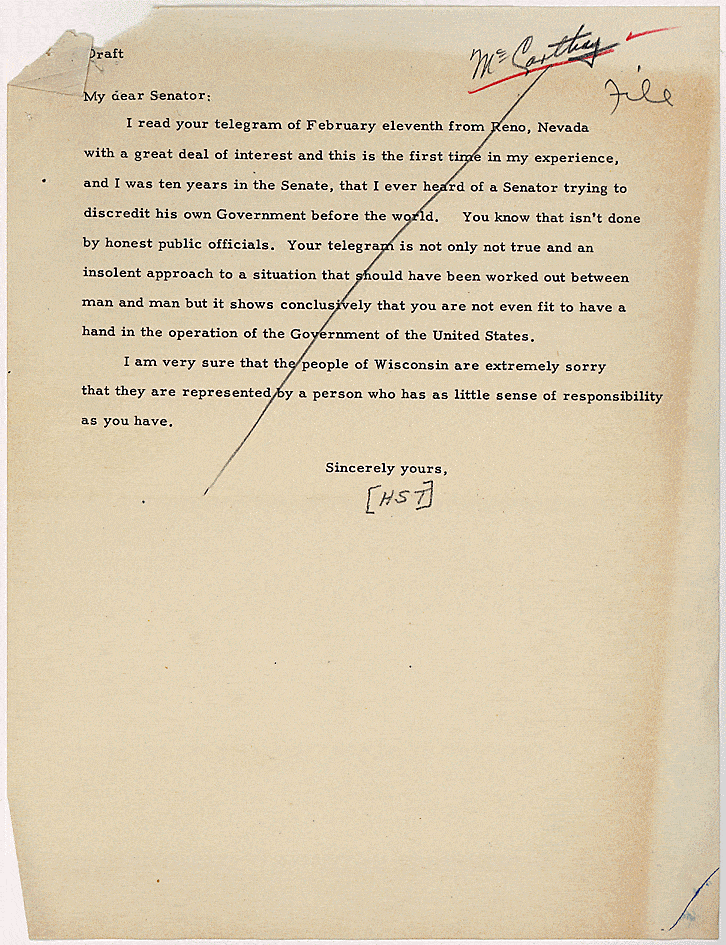
Document 4:

Several days after his speech in West Virginia, the state department issues McCarthy an order to submit the list of names he claims to possess.
Based on McCarthy’s demands for the state department to make their loyalty files public, how do you think McCarthy will respond to this request?
Why do you think the newspaper chose to publish the comment about McCarthy’s accusations being “without foundation in fact?”
Source: California Digital Newspaper Collection
Drew Pearson was a columnist for the Washington Post and one of the most well-known, often controversial American journalists in during the McCarthy era. Pearson’s column, “Washington Merry-Go-Round,” was known for its colorful depictions of politicians and other public figures around Washington DC. Pearson’s style of journalism combined factual reporting with a considerable amount of celebrity gossip and rumor; because of his tendency to blur the line of what could be considered “factual reporting” Pearson drew a lot of criticism during his time.
Pearson was also one of the first reporters to engage with McCarthy head-on. As a result of his attacks on McCarthy, the Senator directed many of his speeches against the reporter, claiming he was a “communist tool” and urging readers to boycott any newspapers that published his column.
Below is an excerpt from Pearson’s column dated February 18th, 1950.
Document 5:


Source: California Digital Newspaper Collection
How does Pearson use evidence to counter Senator McCarthy’s claims about communists in the US government?
Some people have described Pearson as a “muckraker” – what does this term imply, and how does this passage from his column support or deny his role as one?
Compare Pearson’s statements about McCarthy with the cartoon below. The cartoon was published in May of 1950 by cartoonist Herbert Block. What does the cartoon suggest about McCarthy’s reliability?
Document 6:
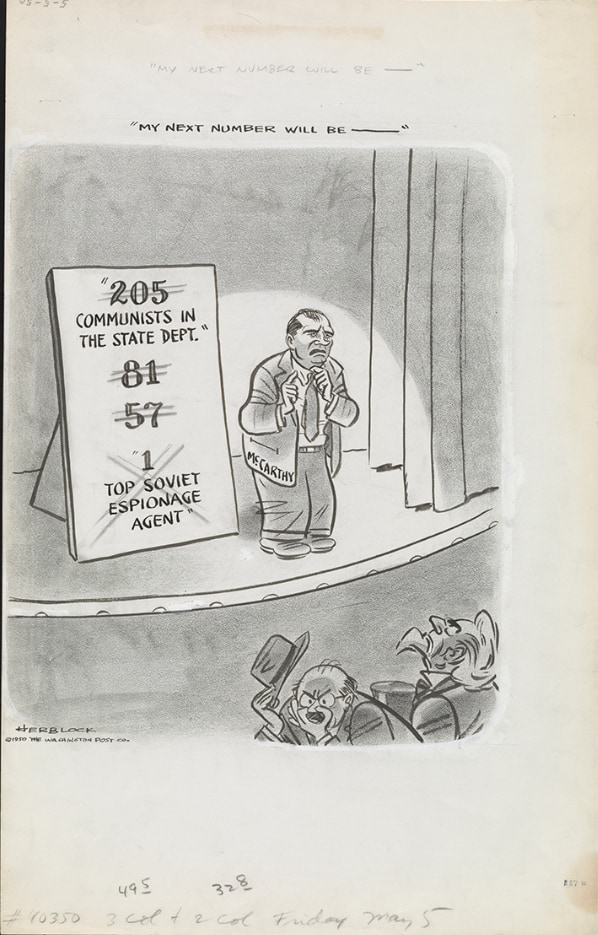
How might you describe McCarthy’s appearance in the above cartoon? Is he angry, confident, nervous? How does this compare with other representations of McCarthy in the media?
Next we will hear a recording of Senator McCarthy himself, as a guest on a live radio talk show. Pay close attention to McCarthy’s tactics when talking about newspapers he accuses of being under communist influence. How does he support his claims? What evidence does he use? How does he respond to President Truman’s use of the term “McCarthyism?”
Document 7:
In 1954 Senator McCarthy turned his attention to the possibility of a communist infiltration of the US Army. In order to investigate conflicting accusations on both sides, the Senate initiated a series of hearings from April to June of 1954.
In the television segment below, watch as Joseph Welch (chief legal counsel for the US Army) reprimands Senator McCarthy for his insensitive and reckless accusations.
During this confrontation (around 1:10 in the video) Welch famously asks McCarthy:
“Have you no sense of decency, sir?”
Document 8:
Joseph Welch’s responses to McCarthy signaled the beginning of a decline in the Senator’s career. Watch as television news anchor Edward Murrow offers a special report on Senator McCarthy in his evening documentary news segment: See It Now. The report included recordings of McCarthy’s speeches, which Murrow used to point out inconsistencies and contradictions in the Senator’s arguments.
Document 9:
Reflect on this line from Edward Murrow’s report on McCarthy:
“the line between investigating and persecuting is a very fine one and the junior Senator from Wisconsin has stepped over it repeatedly”
How would you describe Murrow’s approach to investigative journalism? Does he provide enough supporting evidence for his critique of Senator McCarthy? Would you consider McCarthy’s portrayal in the media a form of investigation or persecution? Support your thinking with evidence from the video or the transcript below.
Link to Transcript of the entire report.

